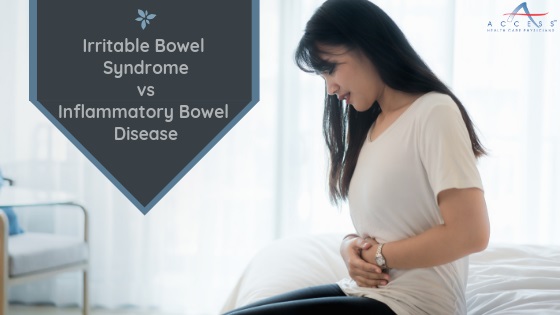With common symptoms such as diarrhea and abdominal discomfort, it is easy to confuse irritable bowel syndrome (IBS) and inflammatory bowel disease (IBD). However, these conditions have very different causes. While there is no cure for IBS or IBD, treatments ranging from lifestyle & diet changes to medications are available to help control the symptoms and make the patient feel more comfortable. Follow along as we break down the differences, symptoms, diagnosis and common treatments for each.
IBS Basics
Irritable bowel syndrome is a very common condition affecting around 12 percent of people in the United States, according to the National Institute of Diabetes and Digestive and Kidney Diseases. IBS is a long-term condition that causes several symptoms in the digestive system. There are typically no visible signs of damage or inflammation to the GI tract. Studies have yet to identify the cause of IBS, but it is more common in women than in men and is more likely to develop in younger adults (under the age of 50).
Symptoms of IBS come and go in cycles known as “flare-ups.” These symptoms may last several days or weeks and may worsen after eating. The changes to the bowel system tend to be sudden and include diarrhea or constipation. Additional symptoms may include: mucus in the stool, gas & bloating, abdominal pain & cramping and a feeling of the bowels not being fully emptied after a bowel movement.
Diagnosis of IBS will typically begin with your doctor looking over your symptoms and medical history. They will discuss the type, frequency and appearance of your stools. Unfortunately, there is no specific test for IBS, but your doctor will typically want to rule out any other conditions and may order blood and stool tests. They may also order an endoscopy and/or colonoscopy and a hydrogen breath test, which tests for lactose intolerance.
As far as treatment for IBS, they typically involve diet and lifestyle changes such as: eating more fiber, avoiding gluten, regular exercise and following an IBS-friendly diet. Your doctor may also choose to add medications to help manage your symptoms. These may include: anti-diarrheal medications, laxatives or fiber supplements, antispasmodics or antidepressants.
IBD Basics
Irritable bowel disease is a term for inflammatory conditions that affect the digestive tract. The main two types of IBD are Crohn’s disease and ulcerative colitis. IBD causes inflammation of the GI tract, is long-term and there is currently no cure. Crohn’s disease can affect any part of the GI tract, however it most commonly affects the start of the colon and the small intestine. It causes patches of inflammation that damage multiple layers in the GI tract walls. The other main type of IBD is ulcerative colitis which affects the colon and the rectum. It causes continued areas of inflammation, but only affects the innermost layer of the colon wall. Studies have not yet identified the cause of IBD, but it is currently believed that it may occur due to a problem with the immune system. Some lifestyle factors such as smoking and family history may also play a role in the risk of developing IBD.
Symptoms of IBD range greatly person to person and may include: diarrhea, bloody stools, unintended weight loss, sudden urge for bowel movement, abdominal pain, and cramping. Other symptoms may also include: constipation, joint pain, fever, irregular menstrual cycles, feeling tired, loss of appetite and nausea. Like IBS, symptoms may come in cycles or “flare-ups.”
Unlike IBS, there are tests that are used to diagnose IBD. These may include: endoscopy colonoscopy, blood tests, X-ray, CT scan and stool tests. These are used to identify areas of inflammation and also rule out other causes or conditions.
There is, unfortunately, no cure for IBD, so the goal is to avoid flare-ups to keep the patient in remission of symptoms. There are many medications used to help the symptoms and may include biologics, immunomodulators and aminosalicylates. Surgery can also be used to bypass the damaged parts of the GI tract, however, the Centers for Disease Control & Prevention (CDC) reports that due to advancements with medications, surgery is becoming less common.
While they both may display similar symptoms, their root causes, diagnosis and treatments are very different. IBD is an autoimmune condition causing inflammation of the GI tract. IBS is believed to be caused by digestive problems and increased sensitivity in the gut. It is important to discuss symptoms with your doctor if you feel as though your digestive system is not functioning properly.
Like and follow us on Facebook, Instagram and our blog page for more information about IBS-friendly diets, articles on digestive health and more.
Written By: S. Campbell for Access Health Care Physicians, LLC.


